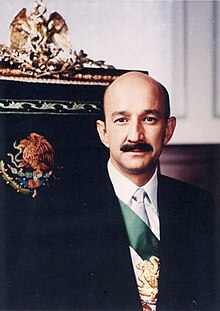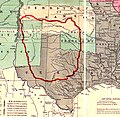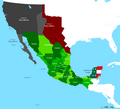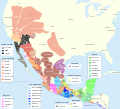|
The Temple of Warriors at Chichen Itza, Mexico
¡Bienvenido! Welcome to the Mexico portal
Mexico, officially the United Mexican States, is a country in the southern portion of North America. It covers 1,972,550 km2 (761,610 sq mi), making it the world's 13th-largest country by area; with a population of almost 130 million, it is the 10th-most-populous country and the most populous Spanish-speaking country. Mexico is organized as a federal constitutional republic comprising 31 states and Mexico City, its capital. It shares land borders with the United States to the north, with Guatemala and Belize to the southeast; as well as maritime borders with the Pacific Ocean to the west, the Caribbean Sea to the southeast, and the Gulf of Mexico to the east.
This is a Featured article, which represents some of the best content on English Wikipedia.
Amarte Es un Placer (transl. Loving You Is a Pleasure) is the thirteenth studio album by Mexican singer Luis Miguel. It was released by WEA Latina on 13 September 1999. Produced by Miguel, it is a pop album with R&B and jazz influences. Miguel was more involved with the songwriting on this record than on earlier albums and was assisted by composers including Arturo Pérez, Armando Manzanero, and Juan Carlos Calderón. Despite the popularity of his contemporaries Ricky Martin and Enrique Iglesias who crossed over to the English-language market, Miguel preferred to sing and record in Spanish at the time. Four singles were released to promote the album: "Sol, Arena y Mar", "O Tú o Ninguna", "Dormir Contigo", and the title track "Amarte Es un Placer". Miguel embarked on a world tour which lasted from September 1999 into May 2000. He performed in Spain, South America, Mexico, and the United States. It became the highest-grossing tour by a Spanish-speaking recording artist. (Full article...)Selected article - Traditional fixed markets in Mexico are multiple-vendor markets permanently housed in a fixed location. They go by a variety of names such as "mercados públicos" (public markets), "mercados municipales" (municipal markets) or even more often simply "mercados" (markets). These markets are distinct from others in that they are almost always housed in buildings owned and operated by the local government, with numerous stands inside rented by individual merchants, who usually sell, produce and other basic food staples. This market developed in Mexico as a way to regulate pre Hispanic markets called tianguis. These tianguis markets remain in Mexico, with the most traditional held on certain days, put up and taken down the same day, much the way it was done in Mesoamerica. These fixed mercados can be found in any town of any size in Mexico. Often, they are accompanied one or more days per week by tianguis, which set up around the main building. However, the largest, best developed and most numerous fixed markets are in Mexico City, which has over 300, 80 of which are specialty markets dedicated to one or more classes of merchandise, such as gourmet food, plants, cut flowers, candy etc. (Full article...)Selected picture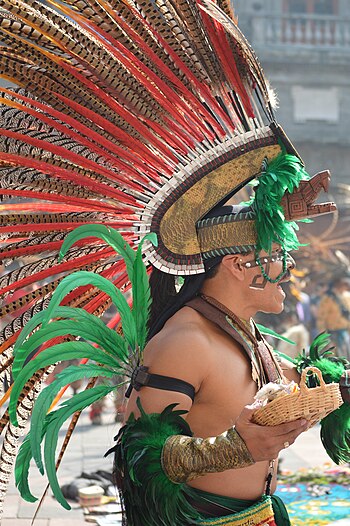 Concheros dancer, in front of the Museo Nacional de Arte, Mexico City image credit: AlejandroLinaresGarcia
This is a Good article, an article that meets a core set of high editorial standards.
On 16 June 2001, Mexico played Costa Rica in a football match at the Estadio Azteca in Mexico City, Mexico on the fourth matchday of the final round in the qualification process for the 2002 FIFA World Cup. Mexico and Costa Rica reached the matchday with four points, both losing as visitors against the United States. Arnoldo Rivera in La Nación described the match as "crucial" as lackluster results by both teams raised doubts prior to the match. The match ended in an unprecedented loss by Mexico. The Mexicans led 1–0 at half-time, with a header by José Manuel Abundis. Costa Rica then made a comeback in the second half, with goals by Rolando Fonseca and Hernán Medford, ending the match 1–2. (Full article...)Selected biography -Carlos Salinas de Gortari (Spanish pronunciation: [ˈkaɾlos saˈlinas ðe ɣoɾˈtaɾi]; born 3 April 1948) is a Mexican economist and politician with Spanish citizenship who served as the 60th president of Mexico from 1988 to 1994. Affiliated with the Institutional Revolutionary Party (PRI), earlier in his career he worked in the Secretariat of Programming and Budget, eventually becoming Secretary. He secured the party's nomination for the 1988 general election and was elected amid widespread accusations of electoral fraud. An economist, Salinas de Gortari was the first Mexican president since 1946 who was not a law graduate. His presidency was characterized by the entrenchment of the neoliberal, free trade economic policies initiated by his predecessor Miguel de la Madrid in observance of the Washington Consensus, mass privatizations of state-run companies and the reprivatization of the banks, Mexico's entry into NAFTA, negotiations with the right-wing opposition party PAN to recognize their victories in state and local elections in exchange for supporting Salinas' policies, normalization of relations with the Catholic clergy, and the adoption of a new currency. From the beginning of his administration, Salinas de Gortari was criticized by the Mexican left, who considered him an illegitimate president whose neoliberal policies led to higher unemployment and were perceived as giving away the wealth of the nation to foreign ownership, whereas he was praised by the right wing and the international community, who considered him a leading figure of globalization and credited him with modernizing the country. Salinas was also backed by the United States government in his bid for Director-General of the newly created World Trade Organization (WTO). (Full article...)
In the news
Selected fare or cuisine -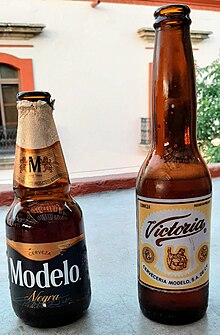 History of beer in Mexico dates from the Spanish conquest of the Aztec Empire. While Mesoamerican cultures knew of fermented alcoholic beverages, including a corn beer, long before the 16th century, European style beer brewed with barley was introduced with the Spanish invasion soon after Hernán Cortés's arrival. Production of this beer here was limited during the colonial period due to the lack of materials and severe restrictions and taxes placed on the product by Spanish authorities. After the Mexican War of Independence, these restrictions disappeared, and the industry was permitted to develop. Furthermore, the arrival of German immigrants during the ephemeral Second Mexican Empire of elected Maximilian I of Mexico, born an Austrian archduke, in the 19th century provided the impetus for the opening of many breweries in various parts of the country. By 1918, there were 36 brewing companies, but over the 20th century, the industry consolidated until today, only two corporations, Grupo Modelo (now owned by AB InBev) and Cervecería Cuauhtémoc Moctezuma formerly known as FEMSA Cerveza (now owned by Heineken N.V.) control 90% of the Mexican beer market. This industry is one of the most prevalent in the country, with over 63% of the population buying one brand or another. Beer is also a major export for the country, with most going to the United States, but is available in over 150 countries worldwide. In 2022, Mexico was the largest beer exporter in the world. (Full article...)
General imagesThe following are images from various Mexico-related articles on Wikipedia.
CategoriesTopicsRelated portalsWikiProjectYou are invited to participate in WikiProject Mexico, a WikiProject dedicated to developing and improving articles about Mexico. | ||||||||||
Cannabis Ruderalis
Purge server cache





